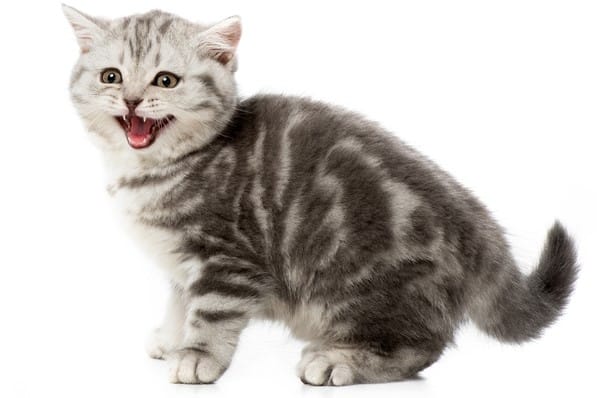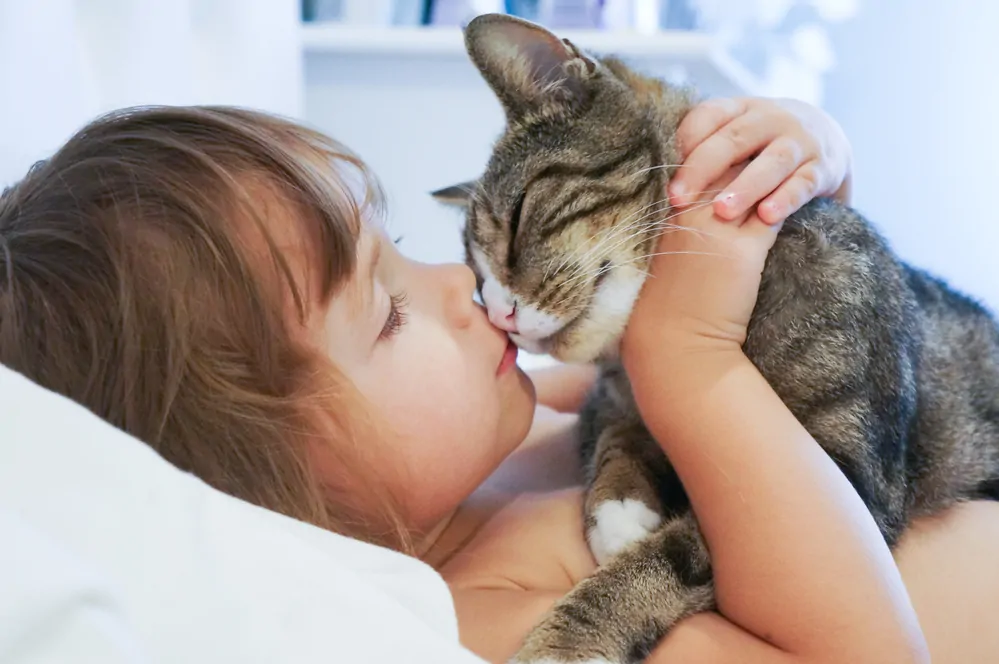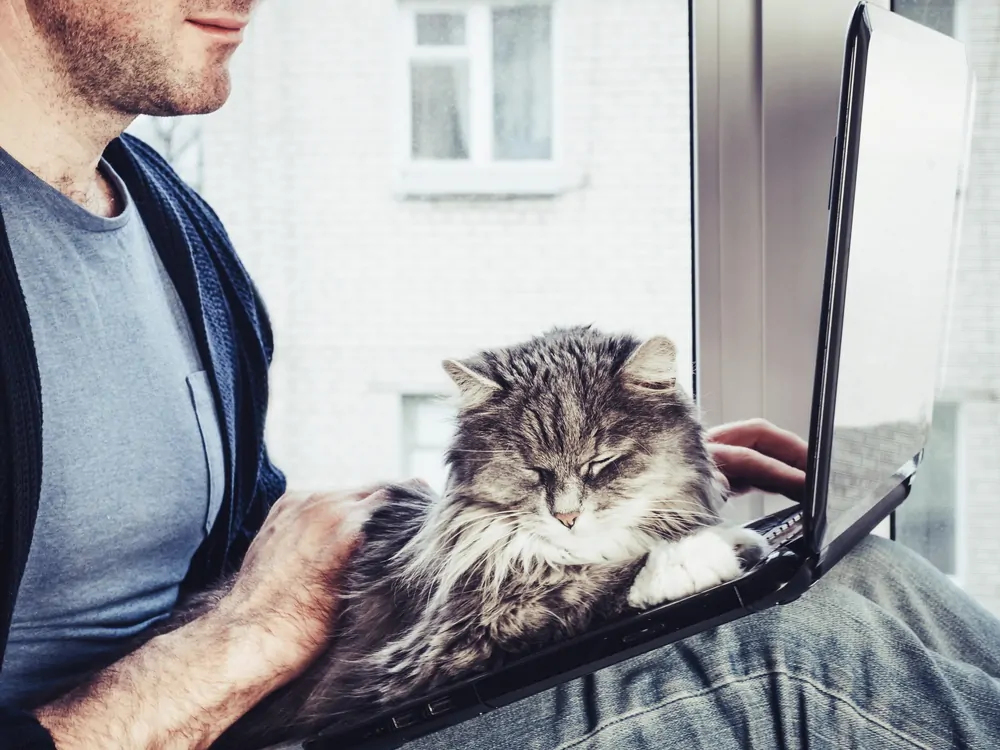At some point in our lives, we have probably all asked ourselves the question, “why do cats meow back at you?”
I’m a big lover of cats and have a few of my own. And this is a question that has always stumped me.
I’ll often talk to my dogs, and while sometimes I will get a response, most times they just look at me like I have two heads.
But when I talk to my cats, they almost always meow back.
In fact, my conversations with my cats are rarely one-sided.
But why is this? why does my cat “talk” back to me?
I decided to investigate!
The simple answer to this question is that:
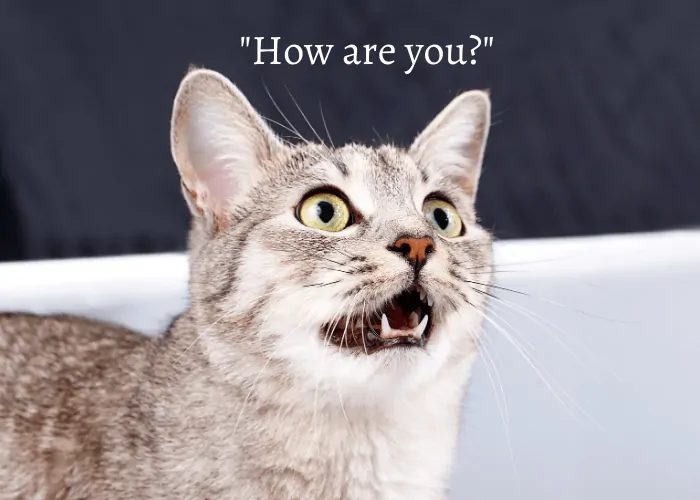
they are trying to communicate with you.
To cats, humans are complex and confusing. This is because, not only do we look much different than cats, but we communicate much differently too.
As humans, we communicate through language. Cats, on the other hand, communicate through a variety of other means like the scent, body language, and tail positioning.
In return, it’s no surprise that it’s difficult for cats and humans to communicate with one another.
Nevertheless, cats will try.
When you speak to your cat, they don’t usually understand what you’re saying, but they will acknowledge that you are speaking to them with a meow.
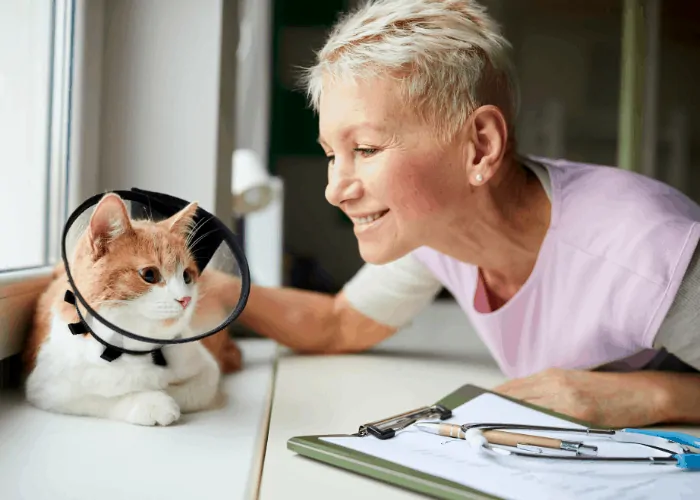
In other words, responding to you with a meow is a cats way of showing you that they want to communicate with you – even if they may not be able to successfully do so.
Of course, kitty communication is much more complex than that – and today we’re going to delve a little deeper into the world feline communication.
Not only will we talk more about the communication lines between humans and cats, but we will also talk methods of communication that cats use to communicate with each other, and what it means if your cat engages in excessive meowing behavior.
Why Do Cats Meow Back At Humans?
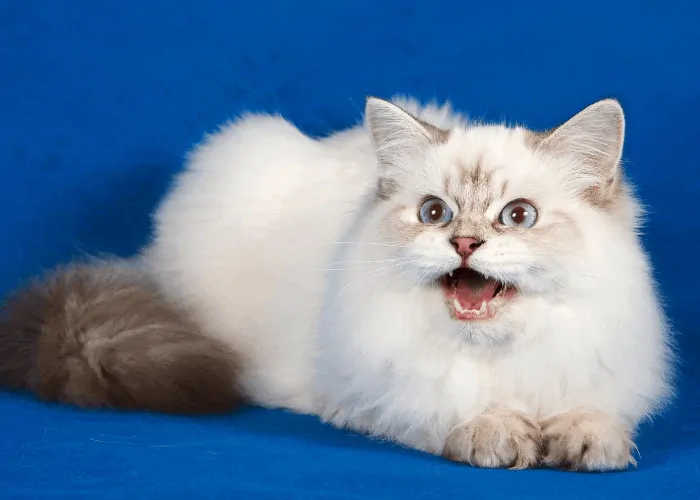
Cats meow as a form of communication.
Unlike humans, cats can’t speak. And if cats tried to communicate with us through scent or tail positioning, we simply wouldn’t understand.
So in an attempt to communicate, they meow.
When you speak to them, cats will acknowledge that you are speaking with them, and try to communicate by meowing back at you. Despite the fact that we don’t speak the same language, meowing is a cat’s way of responding to you and keeping the lines of communication open.
Of course, responding to humans isn’t the only time that cats meow.
So why do cats meow in general? The same answer applies – to communicate. If a cat is meowing, they are trying to tell you something.
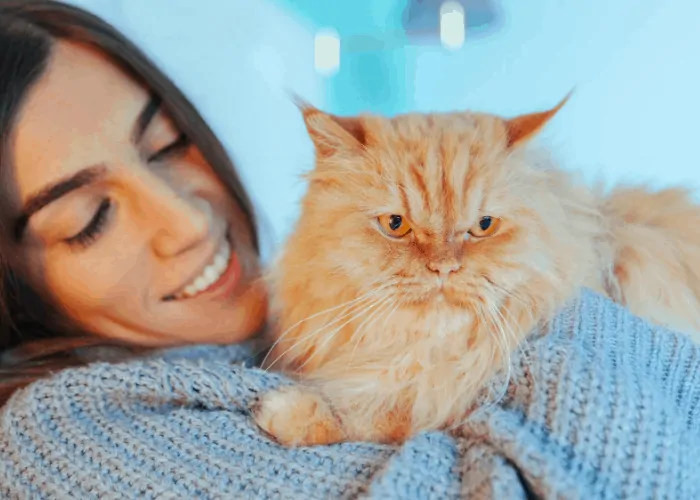
When you speak to them and they respond, your cat is trying to tell you that they are acknowledging you. But what else can a meow mean? Cats may meow as an attempt to:
- Let you know that they are hurt (this may be indicated by excessive meowing)
- Say hi (sometimes cats just want to greet you when you come home)
- Let you know that they are hungry (this type of meow is usually easily recognizable by the owner)
- Seek your attention
- Let you know that they want in
- Let you know that they are in heat (in most cases, this will come in the form of a yowl as opposed to a meow)
- Let you know that they are stressed out (if your cat is meowing more than normal, this may be the case)
- Let you know that they are angry (if a cat feels angry or agitated, it may feel threatened enough to attack. In such a case, they will often let off a mad meow, or a yowl).
- Let you know that they don’t want to be left alone. (Often times cats can get anxious when left alone for long time periods, and can start to meow excessively).
- Express a “love” meow.
Note: Older cats may also tend to meow more excessively as they start to age.
Does My Cat Understand What I’m Saying?
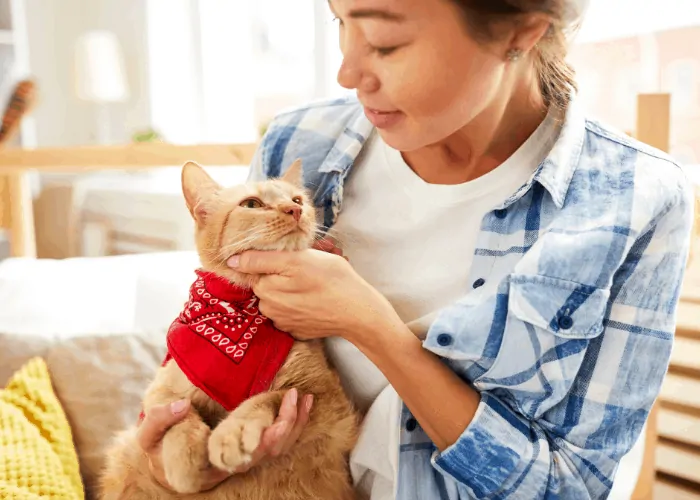
Now that we’ve answered the question, “why do cats meow back at you?”, the next logical question that comes up is, “does my cat understand what I’m saying?”
In most cases, the answer to this question is no.
Cats don’t speak English, and when you’re talking to them in length, they don’t understand what you are saying (as much as they want to).
Having said that, cats can understand certain words. On average, it’s estimated that a cat can understand between 25-30 English words (or words in the language of their owners).
Though they can’t understand complex sentences, they can often distinguish individual words like “treat”, “dinner”, “outside”, “food”, and “no” (even though they may choose not to listen to the latter).
In most cases, cats can also understand their own names.
Unfortunately, cats don’t usually know the names of their owners, nor do they respond to cues like “mommy” or “daddy”. What cats will respond to, however, is the sound of their owner’s voice.
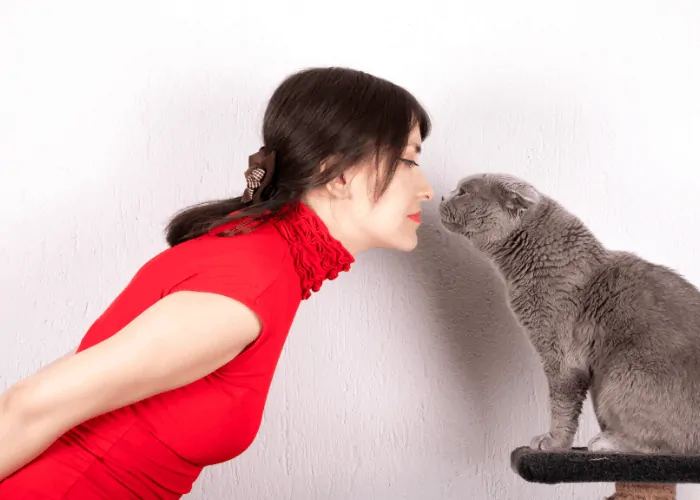
In other words, cats can distinguish who their owners are, simply based on the sound of their voice.
Not surprisingly, cats also understand emotions. You don’t need to tell your cat that you are feeling happy, sad, or upset – they will simply “know”.
Why? Because though we don’t speak the same language, cats and humans are very alike in some other ways.
More specifically, we have very similar hormonal, neurological, and genetic makeups. We also express emotion in very similar ways.
Just like humans, cats can feel sadness, fear, anger, and even grief. So when their human counterpart feels these emotions, a cat can intuitively pick up on them.
This is why you may find your cat to be extra affectionate when you are feeling sad, or extra playful when you are in a good mood.
Do Cats Meow To Each Other?
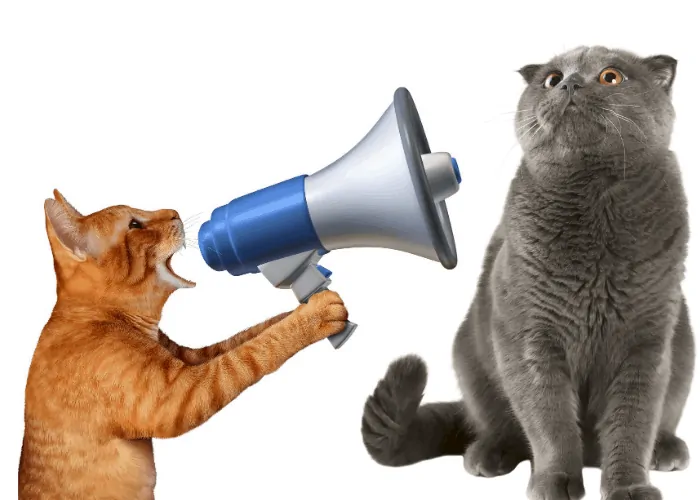
Another logical question after answering “why do cats meow back at you?” is “do cats meow at each other?”
Surprisingly enough, the answer is no – cats do not meow at each other. Rather, they communicate through scent markings and body language.
If you have cats, you’ve probably seen them rub up against each other at some point in time.
No, this isn’t a sign of affection. Rather, it’s the cat’s way of depositing its hormones onto the other cat.
Cats have scent glands located on their foreheads, cheeks, and chins, and will often exchange scents this way.
You may also see them rubbing up against furniture or other objects, which is considered a means of leaving a scent trail or “marking their territory”.
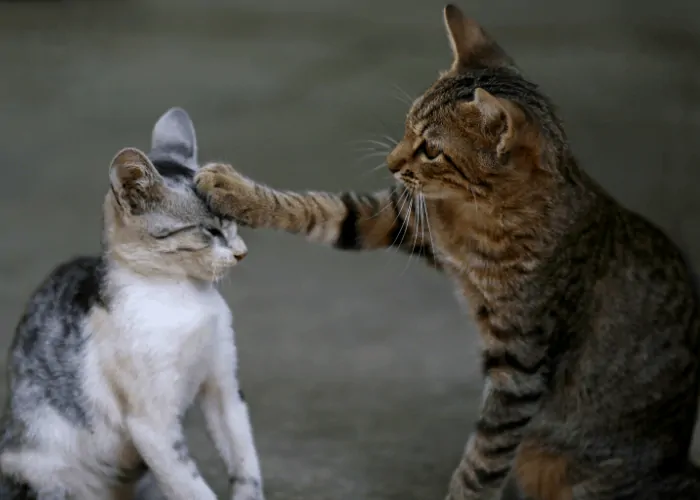
In terms of body language, cats do a lot of communicating purely through their tail. The position of a cat’s tail gives out a great deal of information to their fellow felines.
A curved tail, for example, often represents a playful mood. A tucked tail may signal fear, a raised tail often signals confidence, and a low tail can signal aggression.
Aggression can also be signaled by a whipping of the tail, while a little sway can show that your cat is concentrating on something.
When a cat wraps it’s tail around another cat, it signals friendship or love. And this is how cats communicate their feelings with other cats – not through meowing.
With that being said, there is one exception to this rule. Mothers and kittens will communicate through a meow.
Kittens may meow to get their mother’s attention or to signal that they are cold or hungry. A mother may also meow to her young to get their attention, or to tell them to “follow me”.
Conclusion:
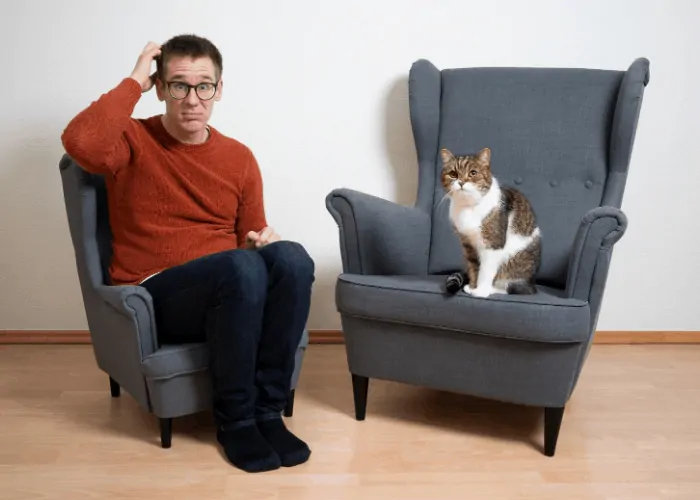
So why do cats meow at you?
They are simply trying to talk to you.
Cats don’t meow at each other because they have other forms of communication that they use.
Meowing, however, is the only form of communication that most humans “understand”.
Cats can meow for a variety of different reasons, whether it be to say a simple hello, to signal that they are hungry, or to signal that they are in distress.
As a cat owner, you will quickly learn what your cat wants when it meows.
If meowing becomes excessive, this could be your cat engaging in attention-seeking behavior, but could also be a sign of distress. Take them to the veterinarian if meowing does not subside.
Related Questions:
What does it mean if my your cat won’t stop meowing?
Cat’s meow for a variety of different reasons. But what does it mean if your cat is meowing excessively? As we already established, meowing is a cat’s way of trying to communicate with us.
Excessive meowing then, means that we haven’t yet received the message that our cat is trying to convey.
If your cat won’t stop meowing, try tending to some of the needs that we listed above under the “what does a meow mean?” section. If you can’t seem to resolve the issue, it could be that your cat is attention seeking.
In some other cases, your cat may be ill or hurt. If meowing doesn’t resolve, and it’s not attention seeking behavior, it’s advised to take your cat to the vet immediately to determine if there is any underlying condition that may be causing them stress.
Should I worry if my cat doesn’t meow at me?
No. Meowing is not an instinctive behavior, it is a learned behavior. Kittens learn meowing as a form of inter-species communication from their mother when they are young.
If the lesson is never learned, cats may not meow as a result. Many stray cats, for example, will not meow when interacting with humans.
This is because as kittens, humans were never around, and therefore meowing was not a necessity, and they never learned to communicate with humans.
At the same time, all cats have their own personalities, and some are more vocal than others.
If your cat doesn’t meow at you, it could just be their personality. Having said that, if your cat meows often, and then suddenly stops, this could be a sign of sickness, and should be investigated by a veterinarian.
